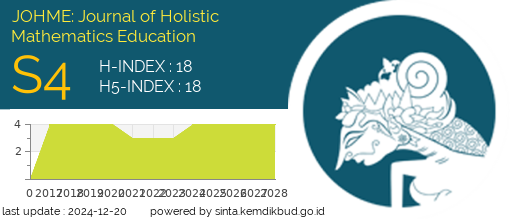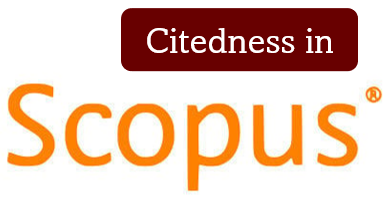IMPLEMENTASI ASESMEN BERBASIS OPEN-ENDED MATHEMATICS PROBLEMS PADA SISWA SMP YANG MENDUKUNG KURIKULUM MERDEKA [IMPLEMENTATION OF AN OPEN-ENDED BASED ASSESSMENT WITH MIDDLE SCHOOL MATHEMATICS STUDENTS THAT SUPPORTS THE MERDEKA CURRICULUM]
DOI:
https://doi.org/10.19166/johme.v8i1.7721Keywords:
assessment, mathematical creativity, Merdeka curriculum, open-ended mathematics problems, asesmen, kreativitas matematis, kurikulum Merdeka, soal terbukaAbstract
Creativity is one of six basic principles required for the Merdeka Curriculum implementation. Not only is it realized through the Pancasila Student Profile Strengthening Project (P5), creativity also needs to be realized in learning activities. This research aims to describe the implementation of problem exercises based on open-ended mathematics problems as a form of formative assessment that supports the implementation of the Merdeka Curriculum, especially in supporting students' mathematical creativity. The research was conducted at SMP Negeri 5 Malang using the qualitative descriptive method. The research subjects were 32 seventh grade students in the 2023/2024 school year.The instruments used were question exercises and rubrics based on open-ended mathematics problems that have met the valid criteria, activity observation sheets, and student interview guidelines. The results showed that the assessment based on open-ended mathematics problems can assess the level of mathematical creativity and prompted the student’s mathematical creativity. In the implementation of assessment based on open-ended mathematics problems based on valid open-ended mathematics problems, data was obtained that the level of practicality of assessment reached a practicality score of 3,674 which means that assessment based on open-ended mathematics problems is easy to use. Based on the response questionnaire and interviews, further research is recommended to integrate open-ended mathematics problems-based assessment with gamification.
BAHASA INDONESIA ABSTRACT: Kreativitas merupakan salah satu bentuk profil pelajar Pancasila. Tidak hanya diwujudkan melalui Proyek Penguatan Profil Pelajar Pancasila (P5), kreativitas juga perlu diwujudkan dalam kegiatan pembelajaran. Penelitian ini bertujuan untuk mendeskripsikan implementasi latihan soal berbasis open-ended mathematics problems sebagai salah satu bentuk asesmen formatif yang mendukung pelaksanaan Kurikulum Merdeka, khususnya dalam mendukung kreativitas matematis siswa. Penelitian dilakukan di SMP Negeri 5 Malang dengan metode deskriptif kualitatif. Subjek penelitian adalah 32 siswa kelas VII tahun ajaran 2023/2024. Instrumen yang digunakan adalah latihan soal dan rubrik penilaian berbasis open-ended mathematics problems yang telah memenuhi kriteria valid, lembar observasi kegiatan, dan pedoman wawancara siswa. Pada implementasi asesmen berbasis open-ended mathematics problems yang telah valid, diperoleh data bahwa tingkat kepraktisan asesmen mencapai skor kepraktisan 3,74 yang berarti asesmen berbasis open-ended mathematics problems mudah untuk digunakan. Berdasarkan angket respons dan wawancara, penelitian lanjutan disarankan untuk mengintegrasikan asesmen berbasis open-ended mathematics problems dengan gamifikasi.
References
Ali, D., Amir M. Z., Kusnadi, & Vebrianto, R. (2021). Literature review: Mathematical creative thinking ability, and students’ self-regulated learning to use an open-ended approach. Malikussaleh Journal of Mathematics Learning (MJML), 4(1), 52-61. https://doi.org/10.29103/mjml.v4i1.3095
Allina, B. (2018). The development of STEAM educational policy to promote student creativity and social empowerment. Arts Education Policy Review, 119(2), 77-87. https://doi.org/10.1080/10632913.2017.1296392
Anggraena, Y., Felicia, N., Ginanto, D. E., Pratiwi, I., Utama, B., Alhapip, L., & Widiaswati, D. (2022). Panduan pembelajaran dan asesmen pendidikan anak usia dini, pendidikan dasar, dan menengah. Retrieved from https://ditsmp.kemdikbud.go.id/download/panduan-pembelajaran-dan-asesmen-kurikulum-merdeka/
Arikunto & Jabar. (2010). Evaluasi program pendidikan: Pedoman teoritis praktis bagi mahasiswa dan praktisi pendidikan (2nd ed.). Jakarta, Indonesia: Bumi Aksara.
Ariska, D., Asril, Z., & Aswirna, P. (2021). Pengembangan asesmen higher order thinking skills (HOTS) berbantuan aplikasi lectora inspire terhadap kemampuan berpikir kritis dan berpikir kreatif peserta didik. JCM: Journal Cerdas Mahasiswa, 3(1), 111-125. Retrieved from https://ejournal.uinib.ac.id/jurnal/index.php/cerdas/article/view/3497/2164
Aziza, M. (2017). The use of open-ended question pictures in the mathematics classroom. New Trends and Issues Proceedings on Humanities and Social Sciences, 4(9), 1-9. Retrieved from https://un-pub.eu/ojs/index.php/pntsbs/article/view/3036
Baer, J. (2015). The importance of domain-specific expertise in creativity. Roeper Review, 37(3), 165-178. https://doi.org/10.1080/02783193.2015.1047480
Beaty, R. E., & Johnson, D. R. (2021). Automating creativity assessment with SemDis: An open platform for computing semantic distance. Behavior Research Methods, 53(2), 757-780. https://doi.org/10.3758/s13428-020-01453-w
Berry, A., Buntting, C., Corrigan, D., Gunstone, R., & Jones, A. (2021). Education in the 21st century. Cham, Switzerland: Springer International Publishing. https://doi.org/10.1007/978-3-030-85300-6
Bicer, A. (2021). A systematic literature review: Discipline-specific and general instructional practices fostering the mathematical creativity of students. International Journal of Education in Mathematics, Science and Technology, 9(2), 252-281. https://doi.org/10.46328/IJEMST.1254
Christopher, I. O., Julie, O. I., Charity, C., & Janehilda, A. O. (2020). Assessment of students’ creative thinking ability in mathematical tasks at senior secondary school level. International Journal of Curriculum and Instruction, 12(2), 494-506. Retrieved from https://files.eric.ed.gov/fulltext/EJ1271171.pdf
Creswell, J. W. (2012). Educational research. Harlow, UK: Pearson Education.
Ding, L. (2019). Applying gamifications to asynchronous online discussions: A mixed methods study. Computers in Human Behavior, 91, 1-11. https://doi.org/10.1016/j.chb.2018.09.022
Gakko, T. (2021). Matematika untuk sekolah menengah pertama kelas VII. Jakarta, Indonesia: Pusat Kurikulum dan Perbukuan Badan Penelitian dan Pengembangan dan Perbukuan Kementerian Pendidikan dan Kebudayaan.
Gunur, B., Ramda, A. H., & Makur, A. P. (2019). Pengaruh pendekatan problem based learning berbantuan masalah open-ended terhadap kemampuan berpikir kritis ditinjau dari sikap matematis siswa. JOHME: Journal of Holistic Mathematics Education, 3(1), 1-15. http://dx.doi.org/10.19166/johme.v3i1.1912
Handayani, U. F., Sa’dijah, C., & Susanto, H. (2018). Analisis kemampuan berpikir kreatif matematis siswa SMP dalam menyelesaikan soal adopsi PISA. Jurnal Math Educator Nusantara: Wahana Publikasi Karya Tulis Ilmiah di Bidang Pendidikan Matematika, 4(2), 143-156. https://doi.org/10.29407/jmen.v4i2.12109
Hobri. (2010). Metodologi penelitian pengembangan (Aplikasi pada penelitian pendidikan matematika). Jember, Indonesia: Pena Salsabila.
Kozlowski, J. S., Chamberlin, S. A., & Mann, E. (2019). Factors that influence mathematical creativity. The Mathematics Enthusiast, 16(1), 505-540. https://doi.org/10.54870/1551-3440.1471
Long, H., Kerr, B. A., Emler, T. E., & Birdnow, M. (2022). A critical review of assessments of creativity in education. Review of Research in Education, 46(1), 288-323. https://doi.org/10.3102/0091732X221084326
MartÃnez, M., Amante, B., Cadenato, A., & Gallego, I. (2012). Assessment tasks: Center of the learning process. Procedia - Social and Behavioral Sciences, 46, 624-628. https://doi.org/10.1016/j.sbspro.2012.05.174
Matsumoto, T. (2016). Motivation strategy using gamification. Creative Education, 7(10), 1480-1485. https://doi.org/10.4236/ce.2016.710153
Mullis, I. V. S., Martin, M. O., & von Davier, M. (2021). TIMSS 2023 assessment frameworks. Retrieved from https://isc.bc.edu/timss2023/frameworks/pdf/T23_Frameworks.pdf
Nadjafikhah, M., Yaftian, N., & Bakhshalizadeh, S. (2012). Mathematical creativity: Some definitions and characteristics. Procedia - Social and Behavioral Sciences, 31, 285-291. https://doi.org/10.1016/j.sbspro.2011.12.056
Putri, M. I., & Dirgantoro, K. P. S. (2021). Guru sebagai fasilitator dalam mengatasi kesulitan belajar peserta didik pada pembelajaran daring. JOHME: Journal of Holistic Mathematics Education, 5(2), 172-188.https://doi.org/10.19166/johme.v5i2.2881
Rahayuningsih, S., Sirajuddin, S., & Ikram, M. (2021). Using open-ended problem-solving tests to identify students’ mathematical creative thinking ability. Participatory Educational Research, 8(3), 285-299. https://doi.org/10.17275/per.21.66.8.3
Sa’dijah, C., Rafiah, H., Gipayana, M., Qohar, A., & Anwar, L. (2016). Asesmen pemecahan masalah open-ended untuk mengukur profil berpikir kreatif matematis siswa berdasar gender. Sekolah Dasar: Kajian Teori dan Praktik Pendidikan, 25(2), 147-159. https://doi.org/10.17977/um009v25i22016p147
Sari, R. T., & Angreni, S. (2018). Penerapan model pembelajaran project based learning (PjBL) upaya peningkatan kreativitas mahasiswa. Jurnal Varidika, 30(1), 79-83. https://doi.org/10.23917/varidika.v30i1.6548
Soyadı, B. B. Y. (2015). Creative and critical thinking skills in problem-based learning environments. Journal of Gifted Education and Creativity, 2(2), 71-71. https://doi.org/10.18200/jgedc.2015214253
Sriraman, B. (2009). The characteristics of mathematical creativity. ZDM, 41, 13-27. https://doi.org/10.1007/s11858-008-0114-z
Suastika, I. K. (2016). Pengembangan model pembelajaran matematika pemecahan masalah terbuka untuk mengembangkan kreativitas siswa [Doctoral dissertation]. Universitas Negeri Malang. Retrieved from https://repository.um.ac.id/64509/
Subanji, & Nusantara, T. (2022). Mathematical creative model: Theory framework and application in mathematics learning activities. Active Learning - Research and Practice for STEAM and Social Sciences Education. https://doi.org/10.5772/intechopen.106187
Suherman, & Vidákovich, T. (2022). Assessment of mathematical creative thinking: A systematic review. Thinking Skills and Creativity, 44. https://doi.org/10.1016/j.tsc.2022.101019
Titikusumawati, E., Sa’dijah, C., As’ari, A. R., & Susanto, H. (2019). An analysis of students’ creative thinking skill in creating open-ended mathematics problems through semi-structured problem posing. Journal of Physics: Conference Series, 1227(1). https://doi.org/10.1088/1742-6596/1227/1/012024
Titikusumawati, E., Sa’dijah, C., As’ari, A. R., & Susanto, H. (2020). The effectiveness of the integration of open-ended and collaborative (OE-C) learning strategies in reducing gaps of elementary school students’ creative thinking skills. Elementary Education Online, 19(1), 198-207. https://doi.org/10.17051/ilkonline.2020.653653
Torrance, E. P. (1965). Scientific views of creativity and factors affecting its growth. Daedalus, 94(3), 663-681. Retrieved from https://www.jstor.org/stable/pdf/20026936.pdf?refreqid=fastly-default%3A317d380e8e188b94aa25d5802b5937d3&ab_segments=&origin=&initiator=&acceptTC=1Downloads
Additional Files
Published
How to Cite
Issue
Section
License
Authors who publish with this journal agree to the following terms:
1) Authors retain copyright and grant the journal right of first publication with the work simultaneously licensed under a Creative Commons Attribution License (CC-BY-SA 4.0) that allows others to share the work with an acknowledgement of the work's authorship and initial publication in this journal.
2) Authors are able to enter into separate, additional contractual arrangements for the non-exclusive distribution of the journal's published version of the work (e.g., post it to an institutional repository or publish it in a book), with an acknowledgement of its initial publication in this journal.
3) Authors are permitted and encouraged to post their work online (e.g., in institutional repositories or on their website). The final published PDF should be used and bibliographic details that credit the publication in this journal should be included.”










